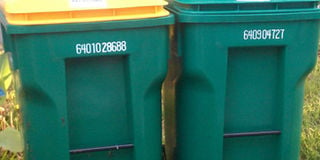Prime
Reaping from plastic waste business

The plastic recycling industy is gaining more interest as environment conservation needs grow.
What you need to know:
Growing interest. People are fast realising that there is money to be made in collecting plastic wastes
Curiosity led me to Mr William Ntege’s home in Naalya. It is not because it is a state of the art house/home but because of the number of people that visit this home daily laden with bags of waste. To me and you it is waste but to them it is a source of earning an income.
Five years ago, Mr Ntege was a plastic waste collector. He used to walk for almost 10 hours a day combing through garbage cans in search of all kinds of plastics including: used mineral water bottles, jerry cans, basins, cups, plates among others.
“I started as a plastic waste collector. We could earn about Shs200 per kilogramme of waste collected. The people we were collecting the plastics for were making a lot of money. I also decided to become a boss,” Mr Ntege says with a reassuring smile, kind of communicating that life has changed for the better.
Ntege cannot tell the number of people he currently employs because he encounters different collectors on a daily basis.
“The biggest number of the collectors is from the streets. In a day, they earn enough to feed them and actually others have moved on to become bosses like me. People are fast realising that there is a lot of money in collecting plastic waste, so everyone is joining the trade,” he says.
Mr Ntege sells his collection to Plastic Recycling Industries (PRI), the largest plastic recycling industry in the country that is located in Nakawa.
At the industry, he is paid between Shs500-Shs900 per kilogramme of plastic waste. He collects about 10 tonnes per month.
At the end of the month, Mr Ntege says he makes over Shs1 million because he is still at a small scale. Upper scale plastic traders make about Shs4 million per week with a collection of about 15-20 tonnes per month.
PRI recycles the plastic waste into flake, which is used as raw material in the manufacture of plastics.
Products from PRI are consumed both locally and internationally.
“PET is produced for export to Asia and Europe and HDPE is locally consumed by companies like Nice House of Plastics,” Ms Mariam Namakula, the production manager PRI said.
Polyethylene terephthalate (PET) is the type of plastic labeled with the number one code on or near the bottom of bottles and containers and is commonly used to package soft drinks, water, juice and some foods.
In China, recycled PET from PRI can be used to make new products, including carpets, fabric for T-shirts, athletic shoes, sleeping bags, winter coats and new PET containers. PRI employs about 33 permanent staff and 64 casuals. However, the company employs over 2,000 Ugandans indirectly.
The World Bank estimates that 1 per cent of the urban population in developing countries earns a living through this work.
These workers play a valuable role in many cash-strapped nations, serving as a cheap means of recycling. But working conditions are hazardous, and the dumping of medical waste poses an enormous threat to the humans in this trade. Nonetheless, millions of people who earn a living through waste picking contribute to the conservation of the environment.




